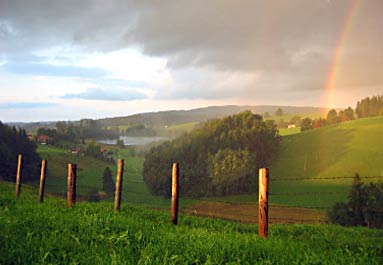This original column is provided free for one-time use with author credit at the end. It may be used for background with author credit. Copyright applies.
#142 FOR IMMEDIATE RELEASE: July 8, 2010
It's hard to celebrate independence with a common cold
By Curtis Seltzer
BLUE GRASS, Va.—I celebrated America’s 1776 Declaration of Independence from the British by coughing, sneezing and getting the tractor stuck.
No one is against independence, except those from whom it must be wrested and those who think its costs outweigh its benefits.
Sometimes independence leads to more peace and freedom, and sometimes a new flawed system replaces an old flawed system with improvement shown on some measures and loss shown on others.
I find it hard to appreciate the intensity of American anger against Britain over the modest taxes imposed after 1763 following the Seven Years War, which saddled Britain with a national debt of what amounts to about $75 billion in today’s dollars. The colonists were not asked to help service this debt, even the portion of it incurred in defending them from the French and Indians. Americans also rebelled against paying any of the cost of keeping British troops on their soil for homeland security.
One economist estimated that Americans in 1763 were taxed annually in current dollars at less than $10 per head with no representation in Parliament while Britons paid about $200 with exactly the kind of representation the colonists were demanding. Even with all the post-1763 British efforts to raise money from the colonies, the actual rates and amounts of taxation before 1776 were not very high. Independence resulted in higher taxes, not lower taxes.
The colonists did not want to accept a direct-taxation precedent. My hunch is that they would have objected just as much to direct taxation with representation as without. And no one over here liked the heavy-handed way Britain administered the new fees. Tax resistance grew, particularly violence against officials, evasion, cheating and smuggling.
The Boston Tea Party of December 16, 1773 was less about the three-pence-per-pound tax and more about the Crown rigging things so that British merchants could sell British-taxed tea directly to American retailers cheaper than the untaxed Dutch tea that the boys of New York, Philadelphia and Boston had been smuggling in tax free. The Tea Party was about business, not personal. Today, we’d call it, a struggle over market share.
The American tax protests between the end of the French and Indian War and 1776 sought to reestablish the politics, economics and no-tax policies that existed prior to 1763. When the British refused to go backward, a war for independence was the only way to go forward.
Tax rebellions succeed from time to time, but tax rebels are rarely good at the broad issues of governing.
Our anti-tax sentiment continued during the Revolutionary War and under America’s first Constitution, which established the Articles of Confederation. We would not tax ourselves to pay for our War. So we borrowed, printed money (which depreciated its value), prayed for gifts and didn’t pay our bills or our soldiers. After the War, the Articles denied Congress the taxing power.
Well short of a decade, everyone understood that the ineffectively financed Confederation was a bust. The anti-tax revolutionaries threw in their towels and wrote a Constitution that gave the new central government the power to levy taxes.
Some 80 years later, the Confederate States of America redeployed the old model. The Confederacy collected only about 8 percent of its revenues from taxes, with 32 percent from borrowing and 60 percent from printing money. A government so financed would collapse from its own weight eventually, even without a war.
These thoughts leave me unsettled just days after we honored our Nation’s founding by televising “competitive eaters” stuffing themselves with hot dogs in a land of food banks.
Maybe, instead of taxing income, we should tax our dumbest activities, like the Jerry Springer “show” or a contest to determine whether any human being can eat more than 17.7 pounds of cow brains in 15 minutes.
Melissa and I got back from British Columbia and the Pacific Northwest just before July Fourth. I brought back an uncommon cold, which, according to my marriage vows, I shared with her.
She liked British Columbians who were friendly and civil, unlike some residents she’d met in Quebec who disliked Americans, disliked the English language and really disliked other Canadians. Perhaps the fellow who refused to give us a simple right-left direction was still stewing over America’s several invasions of Canada that never succeeded.
Melissa was much taken with one, Mr. Ellery, a masseur at Vancouver’s Pan Pacific Hotel, who gave her a deep-tissue massage, endorsed Portland’s Voodoo donuts and told her she had “good glutes.” Triple-threat genius of that sort is way beyond me.
We found the trip’s best food on the way to the Mt. Baker Wilderness Area at the family-run, modestly priced Harvest Moon Bakery in Maple Falls, Wash. (www.HarvestMoonBakery.net) Fresh ingredients, and everything was made from scratch. It’s too bad that John and Jenn Beal can’t franchise their talent and effort.
On Sunday, I lifted my sniffles, water-can eyes and triple-bass voice onto the tractor to brushhog our woods trails. Vegetation had grown higher than the radiator cap.
One steep section has given me fits for years. If it’s wet, I can’t mow it uphill, because my right back tire always hangs up on the same slick tree root. So I mow down the slope in first gear, powered as low as I can, with a foot poised to stomp both brakes, and a hand ready to cut the ignition.
I’d been road-whacking for six hours, and I’d saved this disagreeable task for last. The path was barely visible in the Amazon of blackberries and stinging nettles. Large rocks and worthless logs lay concealed on either side, because that is where I had put them—out of the way.
I crawled downhill, scanning for the road’s whereabouts as I tried to keep the rear-mounted brushhog blade from picking a losing fight with embedded rocks.
And then I came to a patch where everything in the brambles looked alike. I should have stopped, dismounted and figured things out. Instead, I drifted to the left and hung up on a log that ran the length of the tractor.
I said unkind things about my ancestral GPS.
I needed a chainsaw, which was at the farm, a 40-minute walk away.
The sun was going down. My nose was blowing out more stuff than the Deepwater Horizon. My head felt like a brick. I was stiff and cranky. And I knew that no heroic song has ever been sung about a guy fixing his own stupid mistake.
Tractor sticks are usually made worse by rescue efforts before they are resolved. If it went in that direction, I’d need a knight on a bulldozer. This would cost money, and I would be lectured by his chorus of three unneeded observers.
“Glasses fogged up, did they?
“You’d do better to stay in the road.”
“Knew a feller one time who got himself hung like this. ‘Course that log was sliding while he was standing still. Not likely that happened here.”
The next day was a scorcher.
I had to cut the log into three chunks before I could wiggle them out from under the tractor. I did not run the saw into the tires, the tractor or the many rocks that lay on the ground licking their chops. I figured I had one 50-50 shot at backing free.
One option was to ease out as slowly as possible to prevent the back tires from digging into a hopeless, traction-less spin. The other was to gun it as hard as I could in hope that the tractor would jump back a foot or two onto solid ground. Reasonable arguments were made on both sides.
I spoke nicely to my old Ford. I paid compliments to Henry and all of his descendants. I lamented the Edsel’s failure. I was very Canadian—friendly, self-effacing and pretty honest.
Then I gunned it backward as hard and as fast as I could.
I felt the tiniest kinship with the farmers at Concord and Lexington who took a shot against much longer odds.
Had Melissa been there, she might have given a small 2-4-6-8. It would have been too much to have expected her to wear her high-school cheerleader boots, the white leather ones with the green tassels.
Still, I showed that Mr. Ellery a thing or two. Who says Americans can’t get themselves out of a hole of their own making?
Curtis Seltzer is a land consultant who works with buyers and helps sellers with marketing plans. He is author of How To Be a DIRT-SMART Buyer of Country Property at www.curtis-seltzer.com where his weekly columns are posted. He also writes for www.landthink.com.
Contact: Curtis Seltzer, Ph.D.
Land Consultant
1467 Wimer Mountain Road
Blue Grass, VA 24413-2307
540-474-3297
curtisseltzer@htcnet.org
www.curtis-seltzer.com
This original column is provided free for one-time use with author credit at the end. It may be used for background with author credit. Copyright applies.
|









